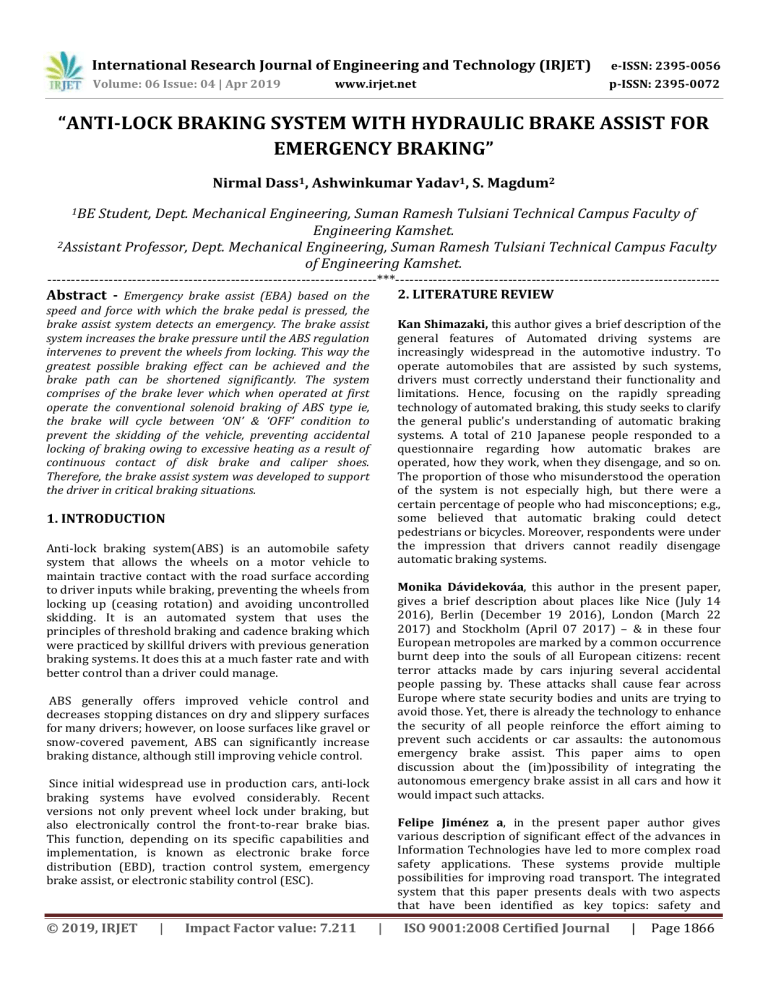IRJET- Anti-Lock Braking System with Hydraulic Brake Assist for Emergency Braking
advertisement

International Research Journal of Engineering and Technology (IRJET) e-ISSN: 2395-0056 Volume: 06 Issue: 04 | Apr 2019 p-ISSN: 2395-0072 www.irjet.net “ANTI-LOCK BRAKING SYSTEM WITH HYDRAULIC BRAKE ASSIST FOR EMERGENCY BRAKING” Nirmal Dass1, Ashwinkumar Yadav1, S. Magdum2 1BE Student, Dept. Mechanical Engineering, Suman Ramesh Tulsiani Technical Campus Faculty of Engineering Kamshet. 2Assistant Professor, Dept. Mechanical Engineering, Suman Ramesh Tulsiani Technical Campus Faculty of Engineering Kamshet. ----------------------------------------------------------------------***--------------------------------------------------------------------2. LITERATURE REVIEW Abstract - Emergency brake assist (EBA) based on the speed and force with which the brake pedal is pressed, the brake assist system detects an emergency. The brake assist system increases the brake pressure until the ABS regulation intervenes to prevent the wheels from locking. This way the greatest possible braking effect can be achieved and the brake path can be shortened significantly. The system comprises of the brake lever which when operated at first operate the conventional solenoid braking of ABS type ie, the brake will cycle between ‘ON’ & ‘OFF’ condition to prevent the skidding of the vehicle, preventing accidental locking of braking owing to excessive heating as a result of continuous contact of disk brake and caliper shoes. Therefore, the brake assist system was developed to support the driver in critical braking situations. Kan Shimazaki, this author gives a brief description of the general features of Automated driving systems are increasingly widespread in the automotive industry. To operate automobiles that are assisted by such systems, drivers must correctly understand their functionality and limitations. Hence, focusing on the rapidly spreading technology of automated braking, this study seeks to clarify the general public's understanding of automatic braking systems. A total of 210 Japanese people responded to a questionnaire regarding how automatic brakes are operated, how they work, when they disengage, and so on. The proportion of those who misunderstood the operation of the system is not especially high, but there were a certain percentage of people who had misconceptions; e.g., some believed that automatic braking could detect pedestrians or bicycles. Moreover, respondents were under the impression that drivers cannot readily disengage automatic braking systems. 1. INTRODUCTION Anti-lock braking system(ABS) is an automobile safety system that allows the wheels on a motor vehicle to maintain tractive contact with the road surface according to driver inputs while braking, preventing the wheels from locking up (ceasing rotation) and avoiding uncontrolled skidding. It is an automated system that uses the principles of threshold braking and cadence braking which were practiced by skillful drivers with previous generation braking systems. It does this at a much faster rate and with better control than a driver could manage. Monika Dávidekováa, this author in the present paper, gives a brief description about places like Nice (July 14 2016), Berlin (December 19 2016), London (March 22 2017) and Stockholm (April 07 2017) – & in these four European metropoles are marked by a common occurrence burnt deep into the souls of all European citizens: recent terror attacks made by cars injuring several accidental people passing by. These attacks shall cause fear across Europe where state security bodies and units are trying to avoid those. Yet, there is already the technology to enhance the security of all people reinforce the effort aiming to prevent such accidents or car assaults: the autonomous emergency brake assist. This paper aims to open discussion about the (im)possibility of integrating the autonomous emergency brake assist in all cars and how it would impact such attacks. ABS generally offers improved vehicle control and decreases stopping distances on dry and slippery surfaces for many drivers; however, on loose surfaces like gravel or snow-covered pavement, ABS can significantly increase braking distance, although still improving vehicle control. Since initial widespread use in production cars, anti-lock braking systems have evolved considerably. Recent versions not only prevent wheel lock under braking, but also electronically control the front-to-rear brake bias. This function, depending on its specific capabilities and implementation, is known as electronic brake force distribution (EBD), traction control system, emergency brake assist, or electronic stability control (ESC). © 2019, IRJET | Impact Factor value: 7.211 Felipe Jiménez a, in the present paper author gives various description of significant effect of the advances in Information Technologies have led to more complex road safety applications. These systems provide multiple possibilities for improving road transport. The integrated system that this paper presents deals with two aspects that have been identified as key topics: safety and | ISO 9001:2008 Certified Journal | Page 1866 International Research Journal of Engineering and Technology (IRJET) e-ISSN: 2395-0056 Volume: 06 Issue: 04 | Apr 2019 p-ISSN: 2395-0072 www.irjet.net 4. CONCLUSIONS efficiency. To this end, the development and implementation of an integrated advanced driver assistance system (ADAS) for rural and intercity environments is proposed. The system focuses mainly on single-carriageways roads, given the complexity of these environments compared to motorways and the high number of severe and fatal accidents on them. The proposed system is based on advanced perception techniques, vehicle automation and communications between vehicles (V2V) and with the infrastructure (V2I). Sensor fusion architecture based on computer vision and laser scanner technologies are developed. It allows real time detection and classification of obstacles, and the identification of potential risks. Advantages: 1. Emergency brake assist provides the extra force of braking with minimal human effort. 2. Prevents the tire wear owing to skidding action on the road. 3. ABS system ensure gradual braking of the vehicle and accidents owing to locking of the brake. Applications: 1. 2. 3. 4. The driver receives this information and some warnings generated by the system. In case, he does not react in a proper way, the vehicle could perform autonomous actions (both on speed control or steering maneuvers) to improve safety and/or efficiency. Light commercial cars Motor Bikes Sports cars Heavy trucks etc. 5. ACKNOWLEDGEMENT On the very outset of the review paper we would like to extend our sincere and heart full obligation to words Prof. P.V. Bute(H.O.D), Prof M.A. Mane, Prof S. Magdum and all staff of mechanical engineering department SRTTC Kamshet. Without there active guidance, help, co-operation and encouragement we would not have made headway in this paper 3. CONCEPTUAL DESIGN Need for EBA:Many accidents caused by ignoring right-of-way, driving on the wrong side of the road, inappropriate speed, insufficient distance from other vehicles and so on might have been prevented had the vehicles been able to brake faster. 6. REFERENCES [1]. Kan Shimazaki, Tasuku Ito “A Review Paper on The public's understanding of the functionality and limitations of automatic braking in Japan” International Association of Traffic & Safety Sciences, November 2017. [2].‘ Monika Dávidekováa,*, Michal Greguš ml. “ Nice, Berlin, London - if every car had autonomous emergency braking system for forward collisions avoidance” The 12th International Conference on Future Networks and Communications (FNC 2017). [3].‘ Felipe Jiménez, José Eugenio Naranjo “Advanced Driver Assistance System for road environments to improve safety and efficiency” 6th Transport Research Arena April 18-21, 2016. Fig .1 The conceptual design Working of the process: When the brake is applied within the ABS limit the speed sensor is active , gear pump is started and the hydraulic oil is pumped onto the brake calliper and brake is applied this will try to retard the axle suddenly..this is sensed by the speed sensor, it will cut off supply to the gear pump hence, brake will be off, due to momentum of vehicle axle will again gain speed, sensor will be off now again pump will start and apply the brake….thus the braking will keep on turning’ON’ & ‘ OFF’ is quick sucession…which is expected from the ABS to prevent locking of the brake. © 2019, IRJET | Impact Factor value: 7.211 | ISO 9001:2008 Certified Journal | Page 1867

